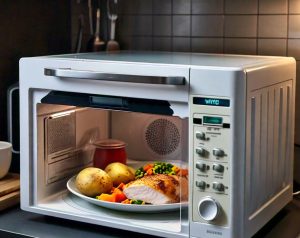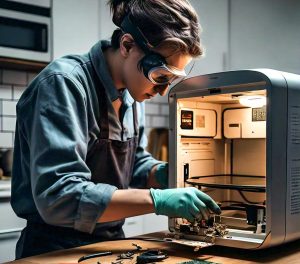A microwave is a kitchen appliance that heats and cooks food by exposing it to electromagnetic radiation in the microwave frequency range.
The question under discussion here is whether or not a microwave can be repaired if it becomes faulty.
In this article, we delve deeper into the ins and outs of microwaves, focusing on their repairability as our central point of interest. We will detail whether you can actually repair a broken or malfunctioning microwave or not, how long the repairing process may take and what potential issues might affect its repairability. In case repairs are not feasible for your particular model, we shall also explore alternatives to fixing your appliance at home as well as offer tips on how to avoid certain common problems with microwaves. Additionally, we’ll touch on frequently asked questions regarding microwaves and their maintenance for added clarity along with our final thoughts on this topic.

Jump To:
Can a Microwave be Repaired?
Yes, a microwave can indeed be repaired. Depending on the issue, various components and parts such as the fuse, door switch or even the motor might require fixing or replacement. However, it’s crucial to hire professional technicians for these repairs. They understand different types of microwaves and their intricacies – including countertop models, over-the-range units, and built-in versions – thereby ensuring safe and effective repair work.
Check out if you can scrap a microwave.
Facts About Microwave Repair
Here we will discuss the important things to note about repairing a microwave.
- Type of Issue: The type of issue can vary from minor problems like blown fuses which are easy to replace, to major issues like a faulty magnetron which need professional help.
- Cost Factor: Depending on the issue and model, repair costs can range anywhere from $50-$400.
- Danger Element: Microwaves use high-voltage electricity which is potentially dangerous. Therefore, it’s safer for complex repairs to be done by professionals.
- The Age of the Appliance: If your microwave is over ten years old, replacing may make more financial sense than repairing it.
- Possible Downtime: Repairing a microwave could mean downtime between 1-2 weeks depending on the availability of parts and complexity of the problem.
We hope you found these facts useful. Now let’s discuss other topics related to microwaving appliances in general.
Check out how long a microwave can run.
Does Heating an Empty Microwave Damage it?
In general terms, operating an empty microwave can cause damage to the appliance. When there’s no food or liquid item inside to absorb the microwaves’ energy, they bounce back to the magnetron that produces them and overheat it, which could burn out this component prematurely.
Does Heating Food with a Faulty Microwave Affect the Food?
If you heat your food in a damaged or malfunctioning microwave, it might not cook evenly. This means certain sections of your meal could remain cold while others are overheated. In some cases, such uneven cooking could lead to health risks if harmful bacteria aren’t adequately destroyed.
Check out if a microwave can leak radiation.
Can Using a Defective Microwave Change the Flavor of My Dish?
A broken oven generally doesn’t alter flavors directly but its compromised performance can indirectly impact taste; for instance by unevenly heating up portions of your meal or failing to properly defrost frozen ingredients before you start cooking them.
Following this discussion on how microwaving impacts different food items and attributes we will now cover frequently asked questions about this common kitchen appliance in our next section.

Frequently Asked Questions (FAQs)
We will now look at the most commonly asked questions related to microwaving and heating.
Can a microwave be repaired?
Yes, a microwave can be repaired. The repair process involves diagnosing the problem, whether it’s a faulty door switch, failed magnetron or dysfunctional touchpad. However, for safety reasons and accuracy, it is recommended to get your microwave repaired by professional technicians who have expertise in dealing with electrical appliances of this nature.
Does microwaving affect the nutrient content in food?
No significant impact on nutrient content is expected when food is heated in a microwave. While some nutrients may be altered during any form of cooking, including microwaving; overall nutrient loss from microwaving is generally comparable to or even lower than other cooking methods due to its shorter cooking time.
Can all glassware be used in a microwave?
No, not all glassware is safe to use in a microwave. Some glass dishes might contain microscopic metal particles which can cause sparks and damage your appliance. It’s advisable to only use glassware that’s labeled as “microwave safe” by the manufacturer when warming up food using this method.
Is heating plastic containers in a microwave safe?
No, heating food in certain plastic containers isn’t completely safe as they might release harmful chemicals into your food upon exposure to high temperatures inside the microwave oven. Always choose plastics labelled ‘microwave-safe‘ while using them for reheating purposes
This concludes our frequently asked questions section about microwaves and their functionality.
Final Word
In summary, understanding how your microwave works, including its dos-and don’ts, can help you properly maintain the appliance and potentially extend its life. Always refer to your manufacturer’s instructions for specific advice on usage and maintenance. If problems should arise, professional repair services are there to help. Remember safety comes first when dealing with electrical appliances like microwaves.


